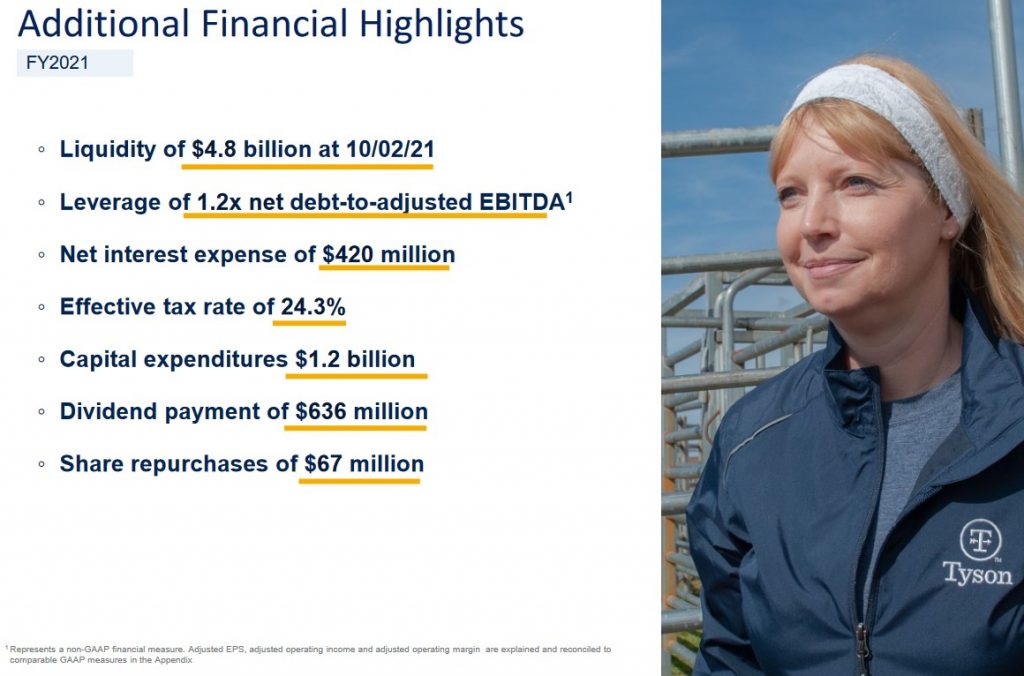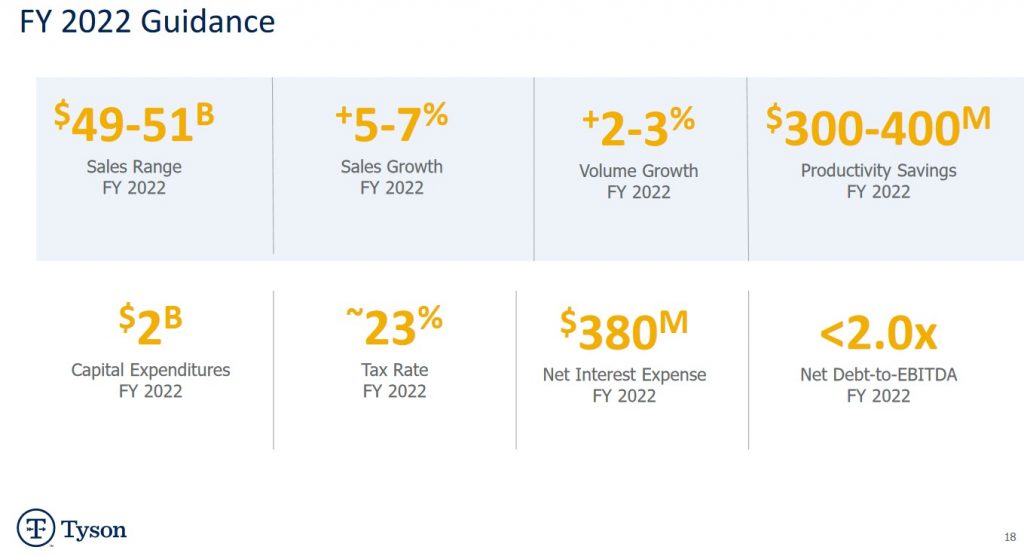Contents
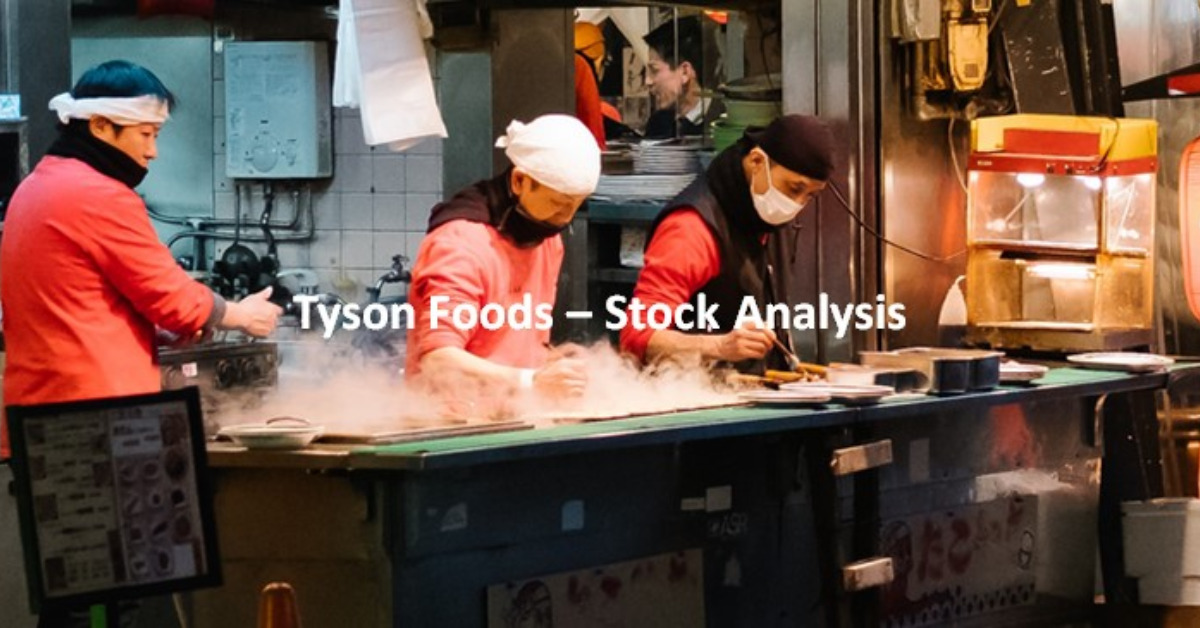
After my August 11, 2021 Tyson Foods (TSN) stock analysis, the company:
- released Q4 and FY2021 results and FY2022 guidance on November 15; and
- held its Investor Day on December 9.
I now take a brief look at TSN's valuation.
Prior TSN posts are accessible in the FFJ Archives.
Tyson Foods - Stock Analysis - Business Overview
TSN, and its subsidiaries, is one of the world’s largest food companies and a recognized leader in protein.
It operates in 4 reportable segments: Beef, Pork, Chicken and Prepared Foods.
Walmart Inc. (WMT) accounted for 18.3% of FY2021 consolidated sales. No other single customer or customer group represented more than 10% of FY2021 consolidated sales.
TSN sells its products in ~140 countries with major sales markets outside the US consisting of Australia, Canada, Central America, Chile, China, the European Union, the United Kingdom, Japan, Mexico, Malaysia, the Middle East, South Korea, Taiwan and Thailand.
Part 1 of TSN's FY2021 Form 10-K provides a comprehensive overview of the company.
Tyson Foods - Stock Analysis - Financials
Q4 2021 and YTD Results
Please refer to TSN's Q4 and FY2021 Earnings Release and Earnings Presentation.
TSN derived a substantial portion of the proceeds deployed toward debt reduction from the sale of the pet treats business, which was included in the Prepared Foods segment; the sale was completed on July 6, 2021 for $1.2B subject to certain adjustments.
TSN also completed the sale of a chicken processing facility it acquired during the August 2019 Keystone Foods acquisition. Net proceeds amounted to ~$0.17B.
In Q3 2021, TSN acquired a 49% minority interest in a Malaysian producer of feed and poultry products for $44 million in addition to future contingent payments of up to ~$65 million.
The construction of 12 new plants (9 chicken, 2 case-ready beef and pork, and 1 bacon) is progressing well. Once complete, these plants will enable TSN to address capacity constraints and the growing global demand for protein.
In addition to ongoing efforts to improve volume, TSN has achieved a 13% price improvement for FY2021 and a 24% increase in Q4 to offset inflation.
Sales improved 20% in Q4 and 11% in FY2021. Sales gains were largely driven by higher average sales prices reflecting TSN's successful pricing strategies during the ongoing inflationary environment.
TSN continues to be faced with a range of higher levels of inflation - most notably higher grains, labour, meat, and transportation costs.
Operating Cash Flow (OCF) and Free Cash Flow (FCF)
TSN generated $3.84B of OCF and incurred $1.209B in additions to property, plant and equipment resulting in FCF of ~$2.6B.
FY2022 Outlook
Investing organically in the business continues to be an important priority. Management has indicated it will also continue to explore paths to optimize the portfolio through M&A.
TSN's new productivity initiative is expected to deliver $0.3B - $0.4B of savings in FY2022 with the rollout of digital solutions across the enterprise and extensive automation projects already underway.
CAPEX of ~$2B in FY2022 (~$0.8B greater than in FY2021) is projected given TSN's healthy pipeline of projects with strong return profiles; a disproportionate share will be allocated toward new capacity and automation objectives. This investment will support the company's initiatives to meet global protein demand growth and allow it to grow its market share.
The projected net interest expense of ~$0.38B compares favourably with $0.462B, $0.485B, and $0.428B in FY2019 - FY2021. This is due to the intentional deleveraging during FY2021.
Net leverage is expected to remain well below 2 times net debt to adjusted EBITDA.
Working capital has been a source of cash over the last 2 years. Management does not expect this to be the case in FY2022 as its business growth will require increased working capital, which combined with deferred tax payments under the CARES Act, taxes on the gain of the pet treats divestiture, litigation settlements, and other discrete items will lead to substantial use of cash in FY2022.
TSN has recently announced the launch of a new productivity program designed to drive a better, faster, and more agile organization. The program is targeted to deliver one billion in recurring productivity savings by the end of FY2024 relative to the FY2021 cost baseline. The 3 imperatives from this productivity program are:
- operational and functional excellence to deliver more than $0.3B in recurring savings. This includes functional efficiency efforts in finance, HR, and procurement that are focused on applying best practices to reduce cost.
- digital solutions with a target to deliver more than $0.25B in recurring savings. The goal is to leverage new digital solutions like artificial intelligence and predictive analytics to drive efficiency and operations, supply chain, planning, logistics, and warehousing. An example of this is the use of technology to ensure shipments are optimally loaded to save freight costs and enhance customer service levels.
- leveraging automation and robotics technologies to automate difficult and higher turnover positions. TSN has identified the automation of the deboning process within its poultry harvest facilities using the combination of third-party and proprietary technologies.
Tyson Foods - Stock Analysis - Credit Ratings
Details of TSN's debt are found in Note 8 on page 59 of 105 in the FY2021 Form 10-K.
TSN has significantly improved the strength of its Balance Sheet in recent years. This provides the company with greater options as they relate to growth opportunities and the return of cash to shareholders.
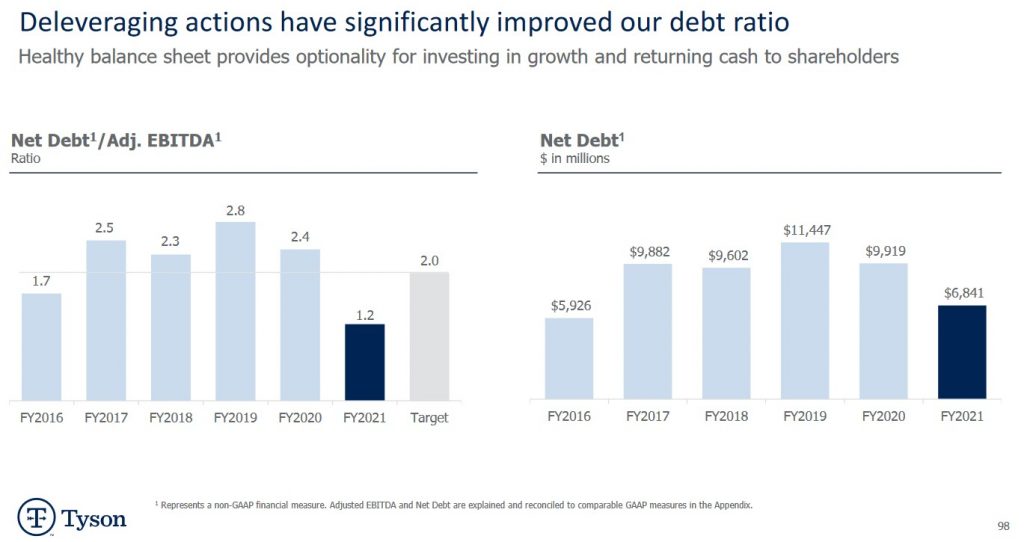
Source: TSN - Investor Day Presentation - December 9, 2021
TSN has substantially de-levered over the past 12 months. It has reduced leverage to 1.2 times net debt to adjusted EBITDA following a $2B reduction in debt and it has improved earnings and cash flow. Despite this, its senior unsecured domestic long-term debt ratings assigned by the major rating agencies remain unchanged from those reflected in my previous post.
- Moody's assigns Baa2 long-term debt credit rating with a stable outlook;
- S&P Global assigns BBB+ long-term debt credit rating with a stable outlook; and
- Fitch assigns a BBB rating with a stable outlook.
Moody's and Fitch's ratings are the middle tier in the lower-medium-grade investment-grade tier. S&P Global's rating is one notch higher.
All three ratings define TSN as having the ADEQUATE capacity to meet its financial commitments. However, adverse economic conditions or changing circumstances are more likely to lead to a weakened capacity to meet its financial commitments.
These ratings satisfy my conservative investment preferences.
Dividend and Dividend Yield
At the time of my August 11 post, TSN was trading at ~$79.50 and the quarterly dividend distribution was $0.445/share thus resulting in a ~2.2% dividend yield.
As I compose this post, TSN's dividend history reflects a $0.445/share dividend payable on December 15 to Class A shareholders. The dividend history segment of TSN's website does not yet reflect the following November 15 announcement:
'Effective November 12, 2021, the Board of Directors increased the quarterly dividend previously declared on August 12, 2021, to $0.46 per share on our Class A common stock and $0.414 per share on our Class B common stock. The increased quarterly dividend is payable on December 15, 2021, to shareholders of record at the close of business on December 1, 2021. The Board also declared a quarterly dividend of $0.46 per share on our Class A common stock and $0.414 per share on our Class B common stock, payable on March 15, 2022, to shareholders of record at the close of business on March 1, 2022. We anticipate the remaining quarterly dividends in fiscal 2022 will be $0.46 and $0.414 per share of our Class A and Class B stock, respectively. This results in an annual dividend rate in fiscal 2022 of $1.84 for Class A shares and $1.656 for Class B shares, or a 3% increase compared to the fiscal 2021 annual dividend rate.'
One of TSN's strategic priorities is to reward shareholders with dividend increases. In my previous post, I had anticipated a dividend increase of 4% - 6% but the increase falls short of this range at ~3.37%.
With shares currently trading at $83.75, the $0.46/share quarterly dividend yields ~2.2%.
The extent to which TSN has repurchased shares has dropped significantly in recent years. I think investors should expect share repurchases to remain at a low level in FY2022 given the company's other priorities reflected earlier in this post.
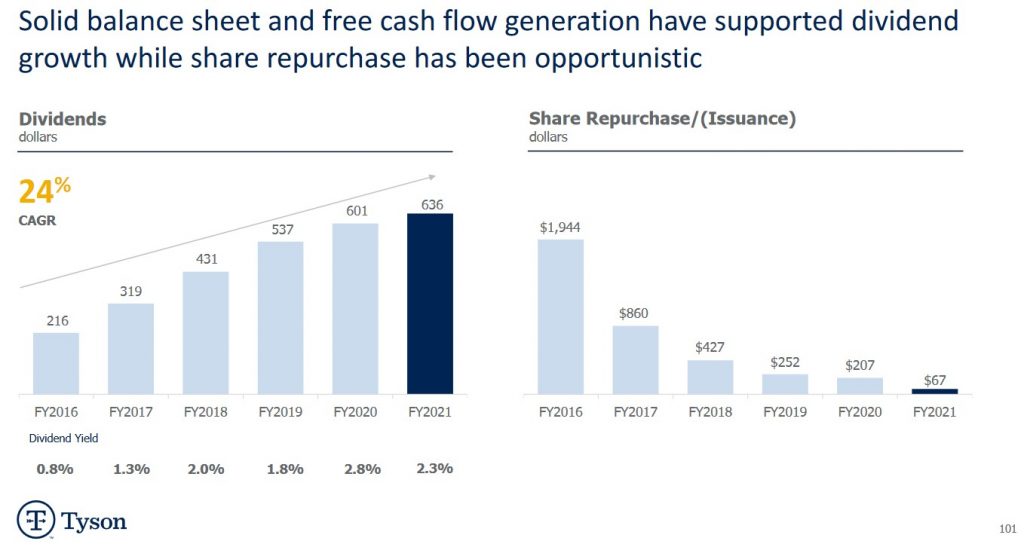
Source: TSN - Investor Day Presentation - December 9, 2021
The consolidated condensed statement of cash flows (page 48 of 105 in the Form 10-K) reflects the repurchase of $67 million of TSN's Class A stock in FY2021 versus $0.207B for the same timeframe in FY2020.
The weighted average Class A shares outstanding is 335, 315, 296, 295, 293, 293, and 293 (in millions) in FY2015 - FY2021; these are the publicly traded shares.
TSN's Class B stock is owned by insiders and is not listed for trading on any exchange or market system. However, Class B stock is convertible into Class A stock on a share-for-share basis. The weighted average Class B shares outstanding remains constant at ~70 million shares.
Tyson Foods - Stock Analysis - Valuation
In my December 17, 2020 post, I disclosed the purchase of shares at $64.96. At the time, FY2021 adjusted diluted EPS estimates from 15 analysts were $5.35 - $6.37/share with a mean of $5.70. Using the mean estimate, the forward adjusted diluted PE was ~11.4. Even if TSN had a dismal FY2021 and only generated $5.35, the forward adjusted diluted PE was ~12. I considered TSN's valuation to be attractive.
At the time of my August 11, 2021 post, shares were trading at ~$79.50 and FY2021 - FY2023 adjusted diluted EPS analyst estimates were:
- FY2021 - 12 brokers - mean of $6.93 and low/high of $5.31 - $7.90. Using the mean estimate, the forward adjusted diluted PE is ~11.5.
- FY2022 - 13 brokers - mean of $6.65 and low/high of $5.73 - $7.45. Using the mean estimate, the forward adjusted diluted PE is ~12.
- FY2023 - 3 brokers - mean of $7.47 and low/high of $6.93 - $8.13. Using the mean estimate, the forward adjusted diluted PE is ~10.6.
Shares are now trading at ~$83.75 and FY2022 - FY2024 adjusted diluted EPS analyst estimates are:
- FY2022 - 11 brokers - mean of $7.40 and low/high of $7.00 - $8.05. Using the mean estimate, the forward adjusted diluted PE is ~11.3.
- FY2023 - 9 brokers - mean of $7.70 and low/high of $7.00 - $8.40. Using the mean estimate, the forward adjusted diluted PE is ~10.9.
- FY2024 - 3 brokers - mean of $7.93 and low/high of $7.39 - $8.84. Using the mean estimate, the forward adjusted diluted PE is ~10.6.
Despite the increase in TSN's share price from that at the time of my previous posts, the forward adjusted diluted PE levels are pretty much unchanged.
I continue to view TSN's valuation as attractive.
NOTE: I place no reliance on the FY2024 earnings estimates because much can happen within two years thereby rendering these estimates meaningless. Furthermore, FY2024 guidance is based on input from only 3 brokers.
Tyson Foods - Stock Analysis - Final Thoughts
My TSN total shareholder return is ~32%. I think, however, that TSN investors are unlikely to generate meteoric total long-term investment returns; future returns will likely be at least ~10% which at least outpaces the rate of inflation.
Shares currently appear to be fairly valued.
Investors with little tolerance for volatility may find TSN to be a 'safe haven'.
I consider my current TSN exposure to be adequate. Despite its fair valuation, I do not intend to acquire additional shares.
I wish you much success on your journey to financial freedom!
Note: Please send any feedback, corrections, or questions to [email protected].
Disclosure: I am long TSN.
Disclaimer: I do not know your circumstances and do not provide individualized advice or recommendations. I encourage you to make investment decisions by conducting your research and due diligence. Consult your financial advisor about your specific situation.
I wrote this article myself and it expresses my own opinions. I do not receive compensation for it and have no business relationship with any company mentioned in this article.


